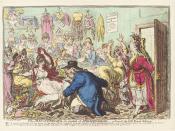Sentimental novel is an emotionally extravagant novel that became popular in Europe in the 18 th century. In repeatedly tearful scenes, a character's feeling for the beauty of nature and for the griefs of others is taken as a sign of a pure heart.The Man of Feeling is one of the best example of this kind of novel.
Mr. Harley, the man of feeling is an extremely virtuous man, he believes that all human beings are like himself. He has many disappointments and some trouble because he believes people are essentially good. He is unambitious for money, and he is unambitious in love. When he finds that the woman he loves is affianced to a wealthy man, he is heartbroken, although he has never declared his love. Because of his feelings on the matter, he becomes physically ill and dies.
The Man of Feeling is certainly among the most important and influential works of sentimental novel. The novel follows Harley, bearing the name of "man of feeling" and weakened aristocrat, as he travels from his rural estate to London and back in a reluctant quest for financial advancement and more sincere quest for kindred spirits. In the novel,the writer debates mostly on sentiment, sympathy, and emotions.
The Man of Feeling is one of the most typical sentimental novels,because in the novel sentiment and sensibility were allied with true virtue, and sensitivity is the main point of the man of feeling.Harley is followed in a series of episodes demonstrating his generosity in an indifferent world he assists the down-trodden, loses his love, and fails to reach success. The novel asks a series of vital questions such as ;what morality is possible in a complex commercial world? Does trying to maintain it make you a saint or a fool? Is sentiment merely a luxury for the leisured classes?
From the novel:
''The stranger was fluent on the subject. "There is no use of money,"said he, "equal to that of beneficence. With the profuse, it is lost; and even with those who lay it out according to the prudence of the world, the objects acquired by it pall on the sense, and have
scarce become our own till they lose their value with the power of pleasing; but here the enjoyment grows on reflection, and our Money is most truly ours when it ceases being in our possession.
"Yet I agree in some measure," answered Harley, "with those who
think that charity to our common beggars is often misplaced; there
are objects less obtrusive whose title is a better one."
"We cannot easily distinguish," said the stranger; "and even of the
worthless, are there not many whose imprudence, or whose vice, may
have been one dreadful consequence of misfortune?"
Harley looked again in his face, and blessed himself for his skill
in physiognomy.''
We can see some another sentimental elements which make the novel a typical sentimental novel:
Harley's departure is also typically sentimental and loaded with emotional responses, the aunt is tearful , as is his servant , and Harley looks back towards his home with a sigh. The servant tries to speak to Harley, but "he was choaked with the thought" , and this choking wordlessness can be seen by the use of the m dashes in the text which also force the reader to
pause to share Peter's sadness.
References:
Brewer, J (1997) The Pleasures of the Imagination London: HarperCollins
Modern Philology, Vol. 75, No. 2. (Nov., 1977), pp. 159-183
The Man of Feeling (Oxford World's Classics) by Henry Mackenzie





